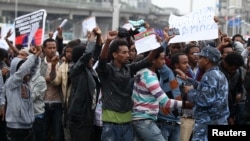Dozens of people were killed and hundreds more injured when Ethiopian security forces opened fire on anti-government protesters over the weekend, according to opposition parties and a human rights group.
Amnesty International says at least 97 people died during the protests across the restive Oromia region and in parts of the Amhara region.
In Oromia, two officials with the opposition Oromo Federalist Congress (OFC) say more than 30 people were killed during protests Saturday and Sunday. Party vice president Mulatu Gemechu told VOA's Horn of Africa Service that the deaths were spread across 12 different towns and cities.
One of the cities worst hit was Bahir Dar, the Amhara region's capital. The opposition Semayawi party canceled a planned rally, citing lack of permission from authorities, but demonstrators still gathered Sunday to voice support for the Oromia protesters and demand that local governance issues be addressed. Witnesses who spoke to VOA say security forces shot live rounds at the crowd. Amnesty reports at least 30 people were killed there.
The spokesperson of the Amhara regional government, Negussu Tilahun, said seven people were killed, and that the government has a responsibility to protect the country and to uphold the law.
Amnesty reports another seven deaths from live fire in the city of Gondar on Saturday. Two more people were killed in the town of Sharwa in the Amhara region, and protests also took place Saturday in Meskel Square, in the heart of Addis Ababa.
The U.S. embassy in Addis Ababa said it is deeply concerned about the "extensive violence." An embassy statement noted that many of the demonstrations took place without authorization, but said citizens should have the right to gather peacefully and to express their opinions.
Government response
The Ethiopian government blames the opposition inside and outside the country for organizing what it calls “unauthorized protests by forces of violence.” According to a statement by the government communications office, some protesters were carrying lethal weapons, including explosives. Opposition leaders deny these allegations, stating that the protesters were peaceful and unarmed.
The government has shut down access to social media since late Friday. Earlier that day, Ethiopian Prime Minister Hailemariam Desalegn warned people not to join the protests.
“We don’t know who takes ownership or is behind these protests and sometimes they are organized by outside anti-peace forces with aims to destabilize this country and are organized through Facebook messages,” he said. “These things don’t have owners, and they are illegal. Therefore participating in illegal protests clashes with and goes against our country’s constitution,” he added.
The focus of the protests is the situation in Oromia, where locals began agitating last year against a plan that would incorporate regional lands into the capital, Addis Ababa. The plan was officially canceled but anti-government demonstrations have continued.
The Oromia region is one of Ethiopia’s nine ethnically-based states. It surrounds Addis Ababa and includes much of central and southern Ethiopia.
In Addis on Saturday, protesters held signs that read “We Want Self-Governance to be Respected” and “Stop Looting Land.” Others held signs that read “Stop Killing Oromo People.” No deaths were reported from the Addis protests, however, witnesses say police beat demonstrators to break up the rally.
Opposition leaders warn that the Ethiopian government’s use of excessive force against civilians will lead to the disintegration of the country. Speaking to VOA today, Terunhe Gemta, the spokesperson of the Oromo Federalist Congress called on the government to learn from experiences of countries like Somalia, Yemen and Syria.
The spokesperson for the Oromia regional government was not available for comment.




